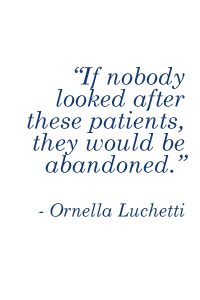Ornella Luchetti: A Life of Retiring Concerns
by Lisa Staudinger
Mid-morning finds Ornella Luchetti preparing medications for the residents of the second floor of the Casa di Riposo in Cagli, Italy. Darkened halls battle the unseasonable heat, capitulating to blazing sunlight only at the courtyard windows. Patients in wheelchairs line the corridors, entertaining visitors or fixating on the front door. A tiny, gray-haired woman inches by cane through her morning routine, frowning at unfamiliar visitors. Ornella cares for every one of them. 
Ornella has built a 32-year nursing career in the rest home. Born in Apecchio, about 20 miles west of Cagli, Ornella decided at 13 she wanted to be a nurse. She says she had always had a heart for helping people, did well in her studies and attended nursing school after liceo or preparatory school. She was working as a medical ward nurse in a Pesaro hospital and expecting her first child when a position became available at the rest home. The competition was stiff but not as stiff as her resolve. She was selected from a large pool of applicants by the home’s doctors, nurses and staff. was the perfect post for Ornella and her passion for service. The position was initially temporary, but she loved the patients so much she stayed.
The rest home’s morning routine begins at 7 a.m. with a whirlwind of breakfast, bathing and dressing. By 9:30, Ornella is carefully distributing medications among small, Sharpie-labeled plastic cups indicating the intended recipients. One hand flips through the charts while the other sorts pills of every color and shape, according to doctor’s orders.
Ornella’s career path followed along with the changes that have occured in Italian family life and culture over the past 40 years. Economic demands have required both partners in a couple to work, she says, leaving unwell elderly parents with no one at home to look after them. Rest homes like the one where Ornella works have become increasingly common in Italy and now house a burgeoning population of ailing senior citizens.
Some rest home residents are well enough to enjoy some independence. They eat unassisted, family-style, in the downstairs dining room. Ornella mainly cares for those no longer able to feed or dress themselves; many have serious mobility challenges or are wheelchair-bound. A squadron of volunteers, many of whom are patients’ friends and family members, help residents eat in the upstairs dining room.
 Ornella works with the rest home’s staff to provide gentle and effective care. An orderly and a nursing assistant appear in the doorway of the nurse’s station with a patient in need of a dressing change. The three work to lift the tiny gentleman from his wheelchair onto the treatment table. The orderly and assistant leave Ornella to tend to the man, who is now comfortably reclining. Ornella gathers her equipment, removes the old bandages and examines the wounds on his leg. She questions him and listens carefully to his answers. Then she irrigates the raw area, fortifying her charge with words of encouragement through the uncomfortable procedure. When she is finished, the freshly applied bandage looks like a medical-text illustration.
Ornella works with the rest home’s staff to provide gentle and effective care. An orderly and a nursing assistant appear in the doorway of the nurse’s station with a patient in need of a dressing change. The three work to lift the tiny gentleman from his wheelchair onto the treatment table. The orderly and assistant leave Ornella to tend to the man, who is now comfortably reclining. Ornella gathers her equipment, removes the old bandages and examines the wounds on his leg. She questions him and listens carefully to his answers. Then she irrigates the raw area, fortifying her charge with words of encouragement through the uncomfortable procedure. When she is finished, the freshly applied bandage looks like a medical-text illustration.
The heart of Ornella’s work is to show patience and love to the residents. Sometimes it’s difficult to understand what is going on with a patient who has dementia or other difficulties communicating. In those cases, Ornella says, she and the other staff work to comprehend the problem and help the patient.
When not working, Ornella is a self-declared homebody who spends a great deal of time with her granddaughter, now 15 months. She shies away from recognition for her caring, hardworking ways, seeming to instead find happiness in helping others. Over time, she adds, she is realizing she has to balance the needs of others with her own.
Many of the residents have visitors every day, Ornella explains, especially if their families are nearby, or if they had close work associates. For her part, Ornella makes a special point of staying closest to those who have no family or friends to visit them.
“If nobody looked after these patients, they would be abandoned,” she says.
Adventure with Us!








